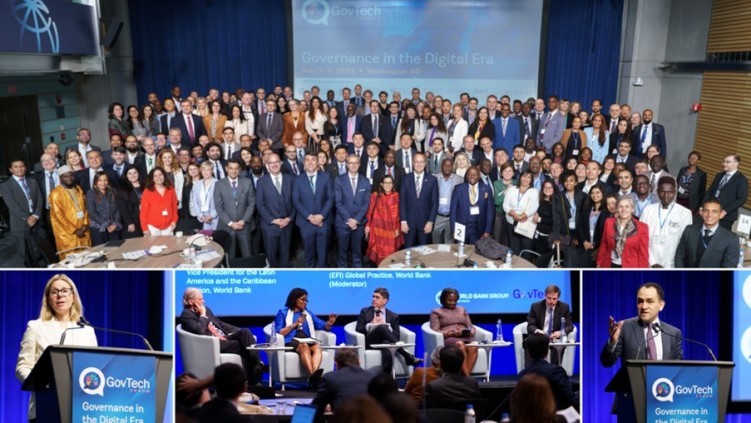Blog
Takeaways from the World Bank’s GovTech Global Forum 2023
The GovTech Global Forum 2023 was an opportunity

Pushing for digital oversight and transparency can often generate resistance that has you feeling like your back’s against the wall. So moments to take a step back, reflect and strategise among peers offer a welcome respite: an opportunity to feel the global critical mass of innovators driving digital governance in the public and private sectors, civil society, and in international development agencies.
This year’s GovTech Global Forum, held in Washington, D.C. on May 3-4, was one such opportunity. Listening to some of the world’s leading authorities on digital transformation in the public sector, it was striking how much has moved on in governance technology over the past few decades, and especially after Covid. It used to be about how to make life easier for governments. Think digitising accounting and payments procedures, and so on. This was a great move forward, but it’s small from where we now stand.
From government-centered to citizen-centered Governance
Governance in the digital era now has the ambition to be citizen-centered: to improve public service delivery for residents by enabling coherent cross-institutional collaboration, information sharing and analysis.
Take the following case in point presented by the World Bank's Global Director for Governance Global Practice, Arturo Herrera Gutierrez. In Mexico City, 2.5 million cars have been registered by the Secretariat of Finance. Their license plates have been issued by the Department of Motor Vehicles. Pollution tests are processed twice a year through a third database at the Environmental Secretariat. That’s three databases with three different data reports, not always producing the same statistics. The result was high management costs, and a confused mess that called for a consolidation by the Mexican authorities.

The global challenge of breaking silos
Mexico was not alone in this situation. It’s a scenario repeated the world over. It makes sense then that technologists lately have been joining forces with social data scientists, public policy analysts, political economists, lawyers and experts from other disciplines, aiming to dissolve institutional silos, streamline systems and processes, and enhance accessibility and accountability in service delivery. That is, in wonk speak, to promote the much hailed, far less realised ‘whole-of-government’ approach.
In Ukraine, tech is a lifeline to services. According to the World Bank’s Managing Director for Operations, Anna Bjerde, one app is providing 21 million people with access to digital IDs and passports, birth certificates and more than 70 government services. In Albania, 500 e-services are available on the e-Albania portal. In Argentina, 17 million people currently benefit from digital services, and 700,000 government staff have been trained on the country’s e-governance systems, the country’s Secretary of State for Public Innovation, Micaela Sánchez Malcolm, told the Forum. Every document in Argentina is digitised: notes, memos, files, resolutions, decrees. This applies to central, provincial and local governments. It’s completely paperless.
The stories demonstrating what’s possible went on and on at the Forum: using data analytics to combat tax evasion and fraud; deploying blockchain to improve public procurement; harnessing AI to do audits, detect welfare fraud, predict and manage disasters, save animals and build windmills…
Measuring digital progress: the GovTech Maturity Index
With so many applications of GovTech, knowing where to start can be hard. It was helpful to learn of the World Bank’s GovTech Maturity Index, which can assist countries in evaluating their level of digital maturity. It uses 48 indicators to assess progress around four thematics: government systems, public service delivery, digital citizen engagement, and GovTech enablers. It is a valuable tool for governmental organisations that are looking to develop a digital transformation roadmap and enhance their operations and services.
The Forum was also about questions and challenges. Among the biggest challenges facing digital governance is data privacy. Digital trust – protecting integrity, autonomy and civil freedoms – is more important than controlling data, and must be built by design. Participants stated that we need consent and conditional extension of data usage. Eliminating our own biases in data sets is another key challenge.

Lessons for Lebanon
There’s a lot to take back to Lebanon, a country beset by corruption and whose clientelist set-up has dampened the growth of a culture of open data access and transparent, data-driven decision making within the state. But it is there within pockets of the public administration, and strongly among civil society. The way forward, continuing the IMPACT experience in e-governance, is to find more ways to connect the two.
Lebanon has unique insights to share on using tech to fight corruption. Lebanon’s experience is small compared to the billions of dollars spent around the world to roll out nationwide e-governance systems, but it is big in its own way because it has succeeded despite strong resistance and deep state maneuvers. Lebanon has achieved success that can clearly serve as an example to many, bringing youth, civil society, tech and champions of change together to co-create, transform, and build institutions that promote transparency, accountability, and data democratisation.
Check out the recordings from the Forum here: Governance in the Digital Era (worldbank.org)